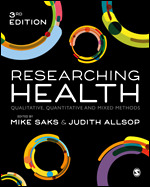Researching Health
Qualitative, Quantitative and Mixed Methods
- Mike Saks - University of Suffolk, UK
- Judith Allsop - University of Lincoln, UK
There are 6 NEW chapters on:
- Principles of Health Research
- Methods of Sampling in Qualitative Health Research
- Qualitative Data Analysis and Health Research
- Researching Health Care Management Using Secondary Data
- Online Research in Health
- Disseminating and Evaluating Health Research
The book is supported by case studies, end-of-chapter exercises, annotated further reading, and access to online resources for both students and lecturers, consisting of SAGE journal articles, web links, PowerPoint slides, and teaching notes for each chapter.
Supplements
For lecturers
- Teaching Notes to help facilitate discussion in class.
- PowerPoints Slides featuring figures, tables and key topics from the book.
For students:
- Chapter Summaries for each chapter.
- Free access to selected SAGE Journal articles
- Web links to relevant resources that will broaden understanding of chapter topics
- A Dataset for Chapter 17
- Key Concepts to strengthen understanding of key terms that appear in the book.
Researching Health is a coherent and comprehensive guide to conducting research within the health and social sciences. The third edition successfully guides the reader through a range of methodologies and methods – unpacking complex theoretical positions to address contemporary issues in health research. The interdisciplinary and international contributions add significant value to this excellent research text.
A well-written, precise research text for health researchers, perfect reading for those who want to know more about the conundrums of the research process. A comprehensive text for first-time researchers and a handy reference book for more experienced researchers. The breadth and scope of the book does great justice to the demands of contemporary health research.
Saks and Allsop have brought together some of the most pivotal health researchers to provide an authoritative textbook. There are a number of new chapters in this current edition providing contemporary knowledge essential for understanding the current context of healthcare. The book is essential reading for students, researchers, healthcare professionals and anyone interested in using evidence to enhance patient care.
A good introductory text
This textbook takes a refreshing look at mixed methods in different health arenas, which is useful for allied health professionals at undergraduate and masters postgraduate level. The additional depth of focus on mixed methods approaches is welcome as we move forward into more complex ways of investigating health from wider perspectives.
Useful comprehensive text
Very useful with a comprehensive account of research methods
Researching health; qualitative,, quantitative and mixed methods is the ‘go-to’ textbook for the novice health researcher. The 2013-second edition of this title was good. However, the third edition has been comprehensively updated with several new chapters. The text is authoritative yet highly readable. The ‘info-boxes, exercises and case studies help to contextualise the many stages of the research process.
This book gives a good insight into the different aspects of research. This knowledge is required by both medical students and public health trainees.
Great support for students carrying out their dissertations in healthcare.








